
“Back home I am considered a wild card,” he grins, crossing his arms. I chuckle and reply, “All of my closest friends are wild cards. I am a bit of one myself.” We instantly understand one another.
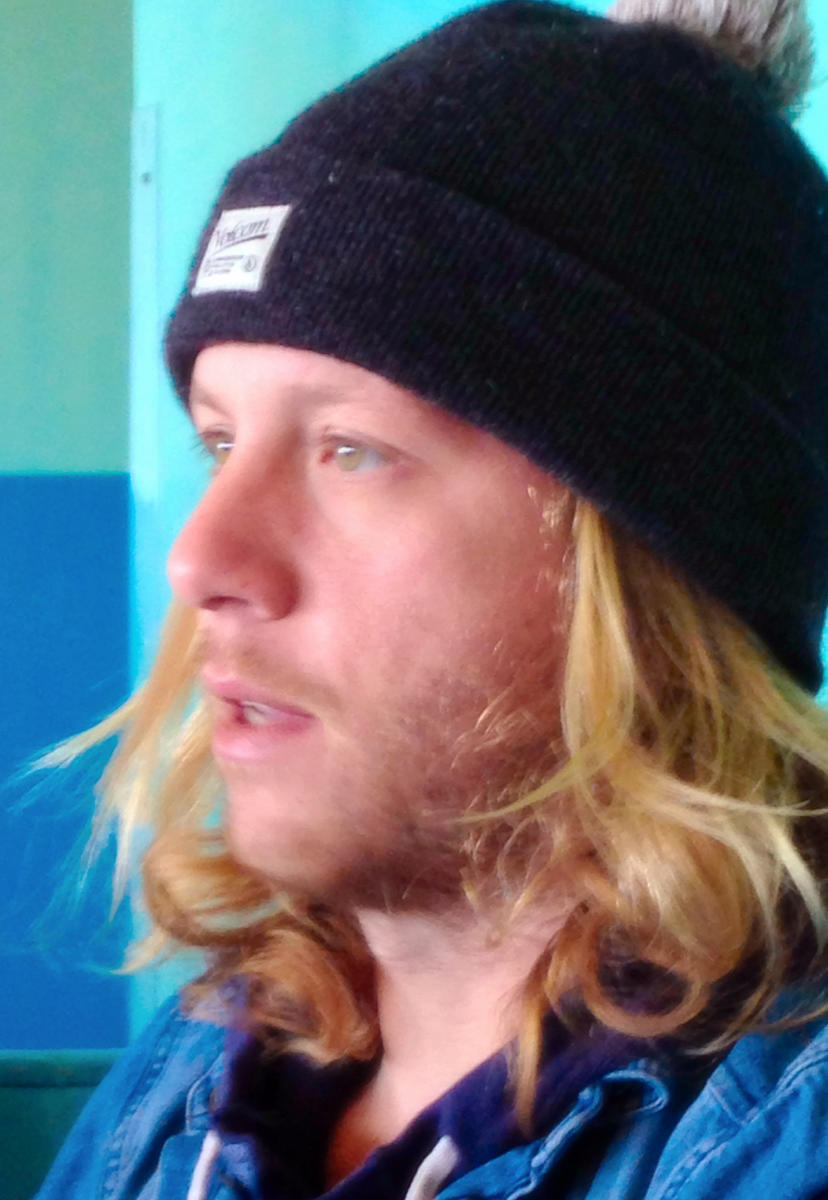
To meet Andy Manzi, you could easily brush him off as a Folly Beach surfer dude. Quiet by nature, with long, blonde hair and clear green eyes, it is evident he spends a good bit of time in the ocean. But behind the surfer exterior there is an experienced warrior—Marine, a rifleman—who has completed two tours in the Iraq War soon after 9/11. From hunting IEDs (improvised explosive devices) on foot, to dodging suicide bombers while patrolling the borders of the war-torn Al Anbar province in LAVs (light armored vehicles), to intensely hot firefights, Andy has seen battle, and the atrocities of war, and lived to tell about it. Though many of his buddies did not come home with whole bodies, Andy shows no external signs of war. He and I are meeting this morning in a hotel lobby by the ocean to hear his story and to talk about what happens internally, in the mind, when you live through war and return to “normal” American life.
Post-traumatic stress disorder, or PTSD, is a clinical term used to describe a condition in which a person experiences a traumatic event (war, sexual assault, abuse, being threatened with a weapon) and the event becomes lodged in the brain in such a way that it sabotages everyday life. PTSD can manifest in symptoms of anxiety, insomnia, depression, “jumpiness” around loud noises or quick movements, and simply reliving the event over and over in the brain. PTSD can also make you “snap” when you least expect it. It can manifest itself suddenly and vary in intensity from mild to debilitating.
“It’s sneaky,” Andy continues, “you never know when it will happen. You have no way of controlling it—it’s just there. When I first returned from Iraq, I would snap and not know why, or when it was coming.” A noise, a look, a person riding too closely behind him in a car, or even a memory could set Andy off, and the anxiety, memories, and intense feelings would emerge.
I first met Andy last summer when he was my surf instructor on Folly Beach. The friendly, quiet instructor with kind eyes and buckets of patience had been working with Josh Wilson, owner of Charleston Surf Lessons and a former professional surfer, for two years, teaching lessons. However, his path to the beachfront outside the Tides Hotel was not a simple one. There’s actually quite a story. Strap yourselves in.
Andy enlisted as a Marine in 2003, just after high school. Having come of age in a somewhat rough upbringing in Waterford, Connecticut, Andy knew his way around a fistfight. Yet the young boy was no bully; he was driven by an internal need to protect the weak, the helpless, the ones who couldn’t defend themselves. So the joining up with the Marines after 9/11 seemed a natural outlet for an 18-year-old kid wanting to see the world and “get the bad guys.”
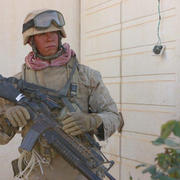
After completing basic training, it was time for the young, eager recruit to deploy for his first tour in Iraq. He was sent to Fallujah in the Al Anbar province, which in the early days of the Iraq war was a hotbed for IED usage. “We were sent in to basically act as policemen, but we weren’t trained as policemen,” Andy explains. “As Marines, we were taught to engage the enemy, to overwhelm him with firepower, corner him, and disable him. But with IEDs, the threat was invisible, like a ghost. The bombs were in trash cans, carcasses, buried in roads. And they were still rough—not very advanced.” To make matters worse for American troops, US military strategy was playing catch-up at the time, trying to figure out how to track, diffuse, and possibly outsmart the IEDs. The only way the military knew to find the hidden, handmade bombs in the early days of the Iraq War was to use humans, troops on foot, poking through trash and roadsides trying to avert an explosion.
Soon after arriving in Fallujah, Andy became acquainted with death. He experienced his first suicide bomber while patrolling in LAVs. His caravan passed a car bomber, and two of his unit’s LAVs were blown sideways. Two Marines died that day, and several were badly injured. Shortly before the incident, Andy saw a Marine bleed out in front of him. Andy was only an 18-year-old kid, but like generations of soldiers and Marines before him, the horrors of war would not wait for him to grow up. The initial symptoms of PTSD had begun to set in, though at the time he could not have known what they meant. Death and war continued. By the end of the tour, Andy’s company had lost 8 Marines, and close to 40 were wounded by enemy contact. “It was almost a good and bad thing that the medics and the medicine were so good. People survived, well, who...maybe they shouldn’t have,” he says, looking down at the tile floor.
It is 9:30 a.m. on a beautiful, sunny morning at the Tides hotel lobby on Folly Beach, just outside Charleston, SC, as we sit speaking over coffee. The waves are small today, and the air is chilly. People roam about on the beach, and a volleyball game has already started between a dad and his kids. A blender at the bar behind us goes off. Andy’s head whips around, “What is the blender doing going off this early?” He tells of a spot on the bridge driving off Folly Beach where the road bottlenecks and cars crowd in behind one another. “That one spot on my drive home gets me every time.” We return to his story.
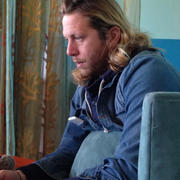
“I returned home after the first tour for four months, and I didn’t know how to handle it. I couldn’t talk to my family about it. Nobody understood. I couldn’t sleep, and I drank a lot. There was a sense that I wouldn’t be around for long, that I was going to die anyway, so who cares? I got into bar fights.” Andy was experiencing PTSD symptoms by this time, but was unaware that his brain and nervous system had been so radically altered by the traumatic events he had seen and experienced in war. “One evening I got into a particularly bad fistfight—there were weapons. I snapped. It was an out-of-body experience, it wasn’t me. I walked away from the fight and thought ‘Holy shit. What just happened? Who was that person?’ ” His voice stalls for a moment. “I wasn’t fighting those guys, I was fighting ghosts.”
The incident shocked Andy. He knew something wasn’t right, but there was no way he was going to see a counselor. “We called it going to see the Wizard,” he grins, looking up. I burst out laughing. The always-clever, distilled jarhead humor was much-needed comic relief. “We all knew that if you opened up about what was going on, you could get medically discharged for depression or anxiety in those days.” And to make the prospect of opening up to the Wizard even more unappealing, therapy for war-weary troops was largely drug-based and ineffective at the time. “More advanced PTSD care only came about around 2011 in the VA,” Andy recalls. Plus, like so many veterans returning from war, Andy’s identity, the only way he knew to live life, was as Sergeant Manzi, USMC. He had nowhere else to go where he could be understood for who he was and what he had seen. He wanted to be back in the action and was not about to jeopardize his career or his risk his place at war with his buddies by opening up. The prevalent attitude among fellow veterans was to look at the guys who had died or been mangled and say, “At least you’re not them. Suck it up.”
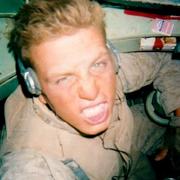
So in early 2005, Andy packed his bags and returned to Iraq, this time to the Jordanian-Syrian border along the Euphrates River to patrol insurgents entering the country through the remote region. In June 2005, Andy’s unit got called up for a major offensive, Operation Spear, near the border of Syria in the Al Anbar province. “After the second siege of Fallujah, the insurgency would grow stronger farther north on the Syrian border. We were there to stop anyone who tried to get in.” The US military brought enormous firepower to the scene—tanks, mortar rounds, helicopters—and infantry with a whole array of weaponry had amassed to capture al-Zarqawi’s recruits and destroy the infrastructure that was building to support al-Zarqawi’s network.
“I was on foot with my buddy Dave and three other Marines, and when fighting broke out we found ourselves in a really bad spot under a bridge. We could see the resistance guys running back and forth and could hear their voices. Minutes later, 10 mortar rounds, our own, friendly fire, were dropped about 10–20 meters from our position.” Andy’s buddy Dave was hit in his leg and in his, ahem, man parts. Fiery, hot shrapnel flew past Andy, missing him by fractions of an inch, searing his arm with the heat. “It was a shit show. Dave was medevac’ed. But for the rest of the day on June 17, we received steady small-arms/RPG fire, along with serious, deadly close mortar attacks from the enemy.” It was relentless firepower, explosions, uncertainty, and death. Andy left the battlefield that day with no major injuries, but the long-term effects of PTSD, like so many other troops who experience that kind of horror, had begun to take hold in his mind.
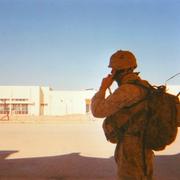
After this battle, something else died in Andy—his faith in some of the leadership. “Dropping the mortar rounds that close to our location was a miscalculation on someone’s part. We were almost killed by my own guys. By this point I wanted to die, like to just get it over with. I knew that this was going to be my fate—war and death. I was daring death. My face changed.”
My friend and poet in residence at the Asheville Center for Arts in Medicine, Mary Ellen Lough, joins us in the lobby of the Tides Hotel. Mary Ellen is a gentle woman, a mother of five children, and a gifted listener. The sun is higher, and the waves are still calm. Mary Ellen works with veterans suffering from PTSD at the Asheville VA Hospital, teaching them to process their memories and emotions through poetry, and is interested in Andy’s healing through surfing. She reads a portion of a poem by Brian Turner:
HERE, BULLET
If a body is what you want,
then here is bone and gristle and flesh...
Here is the adrenaline rush you crave,
that inexorable flight, that insane puncture
into heat and blood. And I dare you to finish
what you’ve started....
We all three sit silent around the driftwood table, sobered by the weight of the words. “Poetry has the ability to hold space for intense emotion,” she explains.
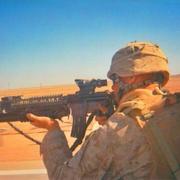
Sergeant Manzi returned home to Camp Lejeune, NC from Iraq a second time. He landed on US soil, and the moment he turned in his rifle, saw green grass again, and felt the safety of being home, he vomited on the grass. He knew something was not right. His nerves were so intensely heightened, yet without the external stimulus of war, it was as if he could not let down. However, instead of wanting to rest and find equilibrium, Andy craved the intensity of battle and made the decision to pursue a career in Force Reconnaissance (Force Recon), an elite intelligence wing of the Marine Corps’ Special Operations. He wanted to “go after the bad guys.” Yet three days before Sergeant Manzi was to deploy for a third time, he received a call that his father had suddenly fallen ill and was paralyzed from the neck down. The Marine Corps halted his orders to deploy, and Andy returned home to Connecticut.
Andy had stopped drinking at the time, was seeking God and life’s answers, and dating a girl. He felt clean and more alive, but his moods could change quickly. He could become paranoid, distant, moody, and jittery in an instant. He wanted to be gentle, calm, and peaceful, but he was Sergeant Manzi, a battle-hardened Marine, and switching off this identity was impossible. Andy wanted to talk to someone, and didn’t know where to turn. It was a lonely cage—feeling as if nobody could understand. To ease some of the pain and deal with his internal drive for battle, Andy took to MMA (mixed martial arts), but he was still looking for something to do to pass the time since he was not spending time in bars drinking. Andy’s father sadly passed away in 2009.
Here is where our story shifts and Fate intervenes.
The war-weary Marine bought a $50 “piece of crap” surfboard at a garage sale on a lark, and the Universe stepped in on Andy’s behalf. Sergeant Manzi had no idea that this $50 purchase would alter the course of his life.
Andy took to surfing quickly. From the moment he caught his first wave, he was hooked. He would go out every day with friends. Andy had enrolled in college, pursuing a degree in history, and between classes he would head to the ocean to find solace in the water and the thrill of catching waves. By the time he had completed school in 2012, Andy was ready to get away. To start over. To be away from the world that only knew him as a “wild card.” So surfboard in hand, Andy booked a one-way ticket to St. Thomas. “St. Thomas was ‘Never Never Land,' ” he jokes. “There were lots of temptations.” Surfing, and generally escaping, was a way of life. He continues, “I was still in a place of feeling very lost, and unable to hold my life together for extended periods of time. I took a trip to visit some friends at Folly Beach and I met Josh Wilson (owner of Charleston Surf Lessons). Josh helped me get a job tending bar at the Tides Hotel and asked me if I could help ‘push people into waves’ for his Charleston Surf Lessons.”
“It was soothing to my soul, being in the water, helping people discover surfing, watching people overcome obstacles and fears, and feeling a sense of purpose. I even ran a camp for children that summer.”
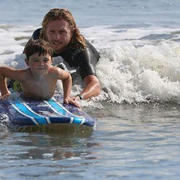
After years of holding it together, the contrast of the safety and happiness Andy had discovered through surfing, teaching surf lessons on Folly Beach, and helping others made him realize he had to get some real help. “Surfing got me halfway there, but I needed more. There were noises pounding in my head, I was in pain, I couldn’t sleep, and I was emotionally drained. I was trying so hard to make it.” Andy went to the emergency room at the VA hospital in Charleston in 2012 and told them he needed help. It was the beginning of real healing.
Andy began two therapy processes called Cognitive Processing and Prolonged Exposure Therapy. These modalities taught him to be his own therapist by processing the difficult memories and reframing them in his mind. “I write down my difficult thoughts and trace how these thoughts have affected my life.” Andy’s time on the water, helping others learn to surf and challenging himself as a surfer, further helped expel the difficult memories and uncontrollable reactions from his body. For the first time in almost 10 years, he had found relief from the PTSD.
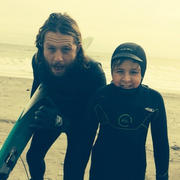
The act of surfing—the wildness of the water, the rhythmic ocean movement, the confidence building it instills, and the rush the surfer gets from catching waves—actually has the ability to retrain the damaged neural pathways by reprogramming these pathways with a healthy, exciting experience. As one veteran puts it, "In war, you wait and wait and something horrible happens. With surfing, you wait and wait and something awesome happens."
“I am not just in the business of teaching surf lessons, I am in the business of changing lives.” The Marine regularly gets together with his “brothers” around Charleston, many of them badly wounded from war. But his heart, his passion, is helping others find healing, as he has, through the water.
For more information on surfing as a healing modality for PTSD, visit jimmymillerfoundation.org and "Treating PTSD with Surf Therapy" from Psychcentral.com